外研版七年级英语下册教师用书:Module 3 Making plans(pdf版)
外研版七年级下册英语Module-3Making-plans知识点及练习(有答案)
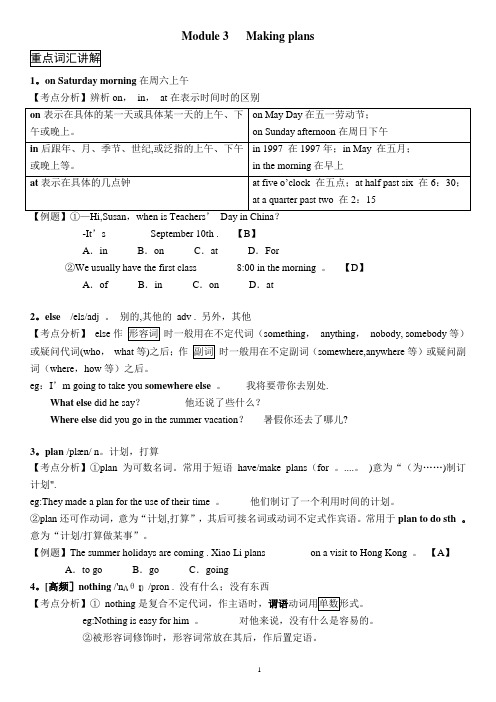
Module 3 Making plans1。
on Saturday morning 在周六上午【考点分析】辨析on , in , at 在表示时间时的区别-It ’s ________ September 10th . 【B 】A .inB .onC .atD .For②We usually have the first class________8:00 in the morning 。
【D 】A .ofB .inC .onD .at2。
else /els/adj 。
别的,其他的 adv . 另外,其他【考点分析】 else 作 时一般用在不定代词(something , anything , nobody, somebody 等)或疑问代词(who , what 等)之后;作 时一般用在不定副词(somewhere,anywhere 等)或疑问副词(where ,how 等)之后。
eg :I ’m going to take you somewhere else 。
我将要带你去别处.What else did he say ? 他还说了些什么?Where else did you go in the summer vacation ? 暑假你还去了哪儿?3。
plan /plæn/ n 。
计划,打算【考点分析】①plan 为可数名词。
常用于短语 have/make plans (for 。
....。
)意为“(为……)制订计划".eg:They made a plan for the use of their time 。
他们制订了一个利用时间的计划。
②plan 还可作动词,意为“计划,打算”,其后可接名词或动词不定式作宾语。
常用于plan to do sth 。
意为“计划/打算做某事”。
【例题】The summer holidays are coming . Xiao Li plans ________ on a visit to Hong Kong 。
新外研版七年级下module3 making plans Unit 1PPT课件
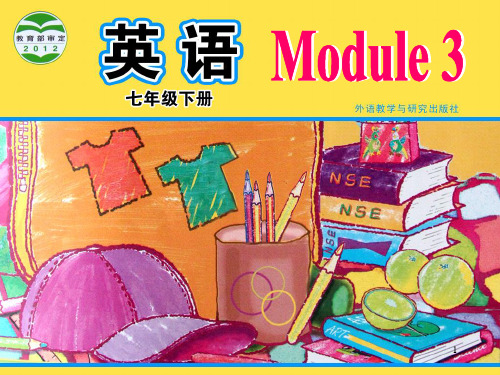
Lingling: Well, …what are you going to do? Betty: Tony and I are going to have a picnic in the park. We’re going to have a (3)_f_a_n_ta_s_t_ic_ time. Are you going to come? Lingling: I’m not sure. Betty: Don’t be (4)_s_il_l_y! What (5)_e_ls_e_ are you going to do?
He is going to do his homework this
evening.
5
play the piano
have a piano lesson
Jim is going to have a piano lesson this
Sunday morning.
6
help with the housework 帮助做家务
17
2. What’s Betty going to do on Saturday afternoon? She is going to see a movie on Saturday afternoon.
3. Who is going to have a piano lesson on Saturday? Lingling is going to have a piano lesson on Saturday.
我总是乐于助人。 能直接做谓语
I always ready to help others. ×
应为:
I am always ready to help others.
初一七年级英语下册外研版Module 3 Making plans 教案
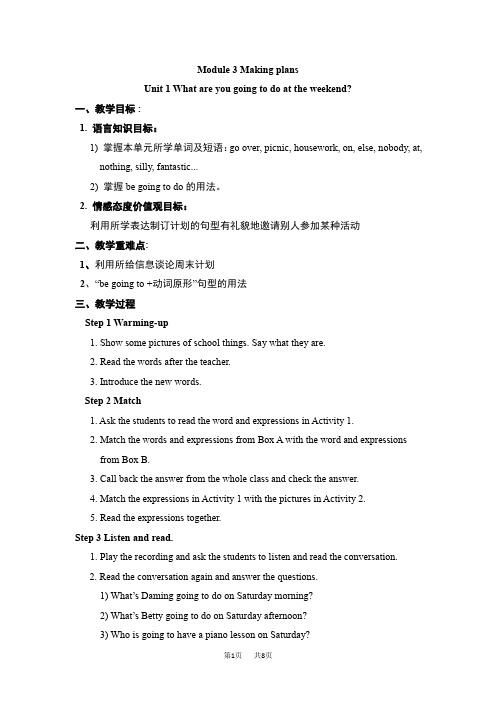
Module 3 Making plansUnit 1 What are you going to do at the weekend?一、教学目标:1. 语言知识目标:1) 掌握本单元所学单词及短语:go over, picnic, housework, on, else, nobody, at,nothing, silly, fantastic...2) 掌握be going to do的用法。
2. 情感态度价值观目标:利用所学表达制订计划的句型有礼貌地邀请别人参加某种活动二、教学重难点:1、利用所给信息谈论周末计划2、“be going to +动词原形”句型的用法三、教学过程Step 1 Warming-up1. Show some pictures of school things. Say what they are.2. Read the words after the teacher.3. Introduce the new words.Step 2 Match1. Ask the students to read the word and expressions in Activity 1.2. Match the words and expressions from Box A with the word and expressionsfrom Box B.3. Call back the answer from the whole class and check the answer.4. Match the expressions in Activity 1 with the pictures in Activity 2.5. Read the expressions together.Step 3 Listen and read.1. Play the recording and ask the students to listen and read the conversation.2. Read the conversation again and answer the questions.1) What’s Daming going to do on Saturday morning?2) What’s Betty going to do on Saturday afternoon?3) Who is going to have a piano lesson on Saturday?4) Where are they going to have a picnic?3. Ask the students to check with a partner.4. Play the recording again .Check the answers..Step 4 Complete the conversation1. Ask the students to read the words in the box in Activity 4.2. Read through the conversation.3. Complete the conversation with the correct form of the words from the box.4. Ask the students to check with a partner.5. Check the answers.6. Read the conversation loudly.Step 5 Listen and repeat1. Play the recording once without stopping.2. Play the recording again and stop at the end of each line. Ask the whole class torepeat.3. Play the recording again and stop at the end of each line. Ask individual studentsto repeat.4. Ask the students to practice the sounds in pairs.Step 6 Work in pairs.Ask and answer questions about your plans at the weekend.1. Ask and answer like this:— What are you going to do on Saturday morning?— I’m going to check my email and do my homework.2. Read through the example with the class.3. Pair them to ask and answer.4. Circulate and monitor their production.5. Complete the diary.Step 7 Language points1. On Saturday morning, I’m going to check my email and do my homework.如果特指“在具体的某一天”或“(在具体的某一天的)上午、下午、晚上”等,须用介词on。
七年级英语下册Module3MakingplansUnit3Languageinuse教案新版外研版
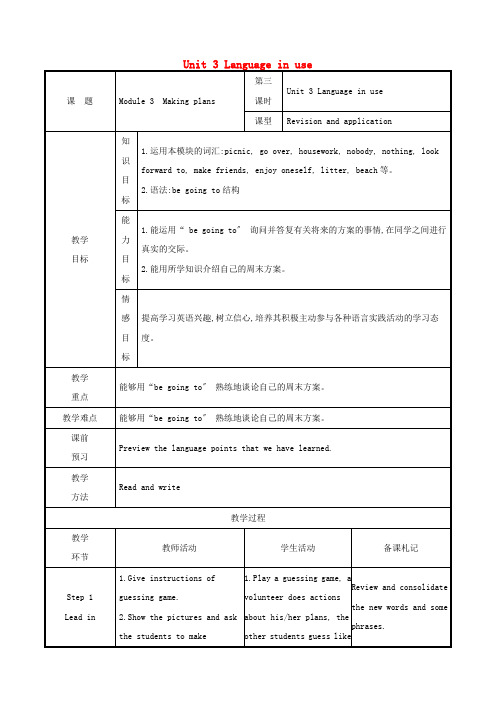
Unit 3 Language in use
be going to结构
肯定句: 主语+ be going to +动词原形
否认句: 主语+ be not going to +动词原形
一般疑问句: be+ 主语 going to +动词原形?
特殊疑问句: 疑问词+ be +主语 going to +动词原形?
2.Make a report about their best friends’ weekend plans, using the information in the form. Then share with the class.
3.Write a plan for the coming weekend.
Unit 3 Language in use
课 题
Module 3 Making plans
第三
课时
Unit 3 Language in use
课型
Revision and application
教学
目标
知识
目标
1.运用本模块的词汇:picnic, go over, housework, nobody, nothing, look forward to, make friends, enjoy oneself, litter, beach等。
Keys: 1.the Great Wall
2.May Day
3. three days
4.Canada
5.7 days/a week
Use what you have learned to write an article.
2021年外研版英语七年级下册课件:Module 3 Making plans(共79张PPT)
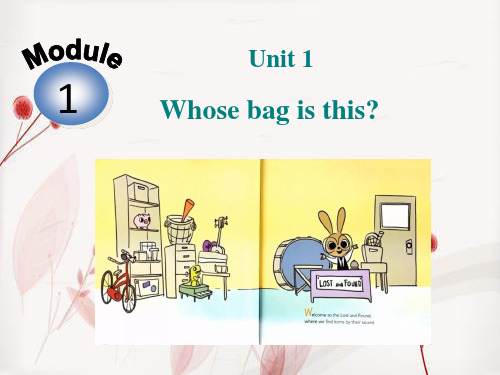
fun n. 娱乐; 乐趣
Words and expressions
summer holiday
暑假
camp n. 营地; 帐篷
Australian adj. 澳大利亚的
sightseeing n. 观光; 游览
go sightseeing
观光
beach n. 海滨; 海滩
Tip:Read quickly to catch the main idea.
glove
watch wallet
/glʌv/ /wɒtʃ/ /'wɒlɪt/
Tom is not careful. Some things are lost(丢失的).
Whose bag is this?
his bag= his (他的)
bag
It’s his bag. It’s his.
Whose crayons are these?
yours mine hers his
A (for the whole class):
•Listen and read the conversation on page 2.
•Review the words and expressions on the blackboard.
•Finish part 5 on page 3.
Words and expressions
May n. 五月
May Day
五一劳动节
late adv. 迟; 晚 adj. 迟的; 晚的
walk n. 步行; 走
take a walk
散步
country n. 乡下; 乡村
second num. 第二
外研版七下Module 3 Making plans Unit 3 Language in use
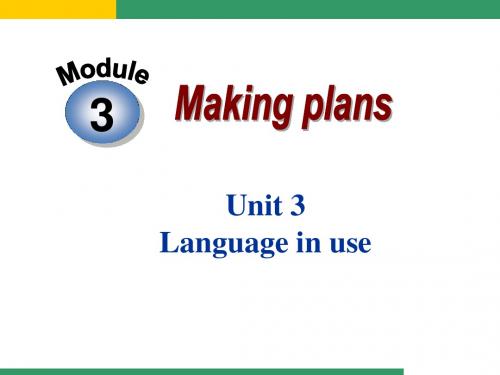
Teaching aims:
1. 语法:一般将来时 2. 语言技能: a. 能用be going to表达自己的计划, 安排 b. 能询问对方的计划, 安排 3. 自学策略: 能根据自己的具体情况 制订学习计划 4. 学习掌握本课生词与短语
Grammar structure: 一般将来时
一、用法:表达打算,计划,有意做某事. 二、形式: Subject + be going to + v.原型 肯定句:
C: I’m going to….
5. Make a group diary for next weekend.
Saturday morning Saturday afternoon Saturday evening Sunday morning Sunday afternoon Sunday evening
I am going to visit Australia.
She is going to buy some clothes.
They are going to play computer
games.
否定和 疑问句 :
I am not going to visit Australia. --Are you going to visit Australia? --Yes, I am / No, I am not. She isn’t going to buy some clothes. --Is she going to buy some clothes? --Yes, she is. / No, she is not.
Sunday?
3.Is Betty going to buy some new clothes? 4.Are you going to see a movie this evening? 5.Is Tony going to play a computer game?
外研版七年级英语下册精选优秀教案 Module 3 Making plans Unit 2 教学设计

外研七年级下册Module 3 Making plans主备人:____________ 审核人:____________ 复备人:____________一、教学内容:Unit2 We’re going to cheer the players.二、课型:Reading and writing三、教学目标:1、能够正确使用下列单词和词组:forward, look forward to, fan, make friends, shirt,cheer, player, hope, win, enjoy yourself, myself, during, May, May Day, late, walk, take a walk, country, second, collect, litter, fun, summer holiday, camp, Australian, sightseeing, go sightseeing, beach, early2、能够读懂描述计划安排的短文,并且判断出文中人物的计划、安排。
3、能够对自己的计划等方面进行简单的描述。
4、通过阅读他人的计划,学会自己做计划。
四、教学重难点:1、能够读懂简单描述计划的短文。
并能在阅读中找出有关作者的计划信息,完成学习任务。
(重点)2、能够正确使用“be going to”的句子来描述计划并表达出计划相关的原因。
(难点)五、教学准备:课堂整体运用任务型教学模式以及阅读课“四个阶段”教学模式。
本课指导学生通过阅读获取信息,培养学生阅读技能。
在教学过程中,采用多媒体手段辅助教学,利用各种图片和习题任务贯穿整个教学过程。
因此,本节课需准备:PPT课件、挂图、录音机、课堂练习表格、奖品六、教学过程:。
外研社版七年级下学期英语教案锦囊:Module 3 Making plans unit2 We’r
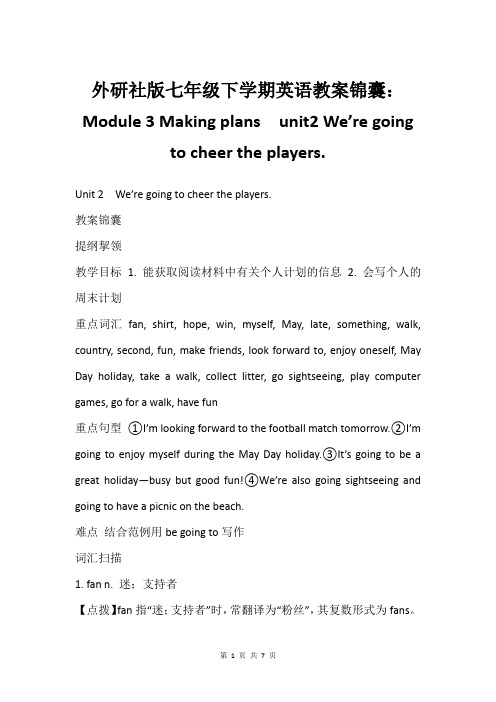
外研社版七年级下学期英语教案锦囊:Module 3 Making plans unit2 We’re goingto cheer the players.Unit 2 We’re going to cheer the players.教案锦囊提纲挈领教学目标 1. 能获取阅读材料中有关个人计划的信息 2. 会写个人的周末计划重点词汇fan, shirt, hope, win, myself, May, late, something, walk, country, second, fun, make friends, look forward to, enjoy oneself, May Day holiday, take a walk, collect litter, go sightseeing, play computer games, go for a walk, have fun重点句型①I’m looking forward to the football match tomorrow.②I’m going to enjoy myself during the May Day holiday.③It’s going to be a great holiday—busy but good fun!④We’re also going sightseeing and going to have a picnic on the beach.难点结合范例用be going to写作词汇扫描1. fan n. 迷;支持者【点拨】fan指“迷;支持者”时,常翻译为“粉丝”,其复数形式为fans。
如:①We’re going to meet other fans, and make some new friends.我们打算见见其他球迷,交一些新朋友。
②We are all fans of Zhao Benshan.我们都是赵本山的粉丝。
- 1、下载文档前请自行甄别文档内容的完整性,平台不提供额外的编辑、内容补充、找答案等附加服务。
- 2、"仅部分预览"的文档,不可在线预览部分如存在完整性等问题,可反馈申请退款(可完整预览的文档不适用该条件!)。
- 3、如文档侵犯您的权益,请联系客服反馈,我们会尽快为您处理(人工客服工作时间:9:00-18:30)。
/% 0 1 & 23 4 % & #
A & -.) * L& C BL D C BW '
!
FFFFFFFFF9;
;)<=>? & FJ F' B3 ] " +FFF % 6*! & # 9" --* ,I " % 04 " % 6 6" $ <( # * ,% $ ,* \ % ! # " -( 0 3 H 3 " $ 7 " $ " % " ,2 = 3 " $ 2 & " ,27 " $ " % I 3 7 " $ " % $ J 3 " $ 2 & " ,2% &7 " $ " % 0+ & # ," ,2 3 & F= F' K3 *U 6 !% 6* # *( # *$ &+ ( ,0<* & <) *" ,% 6*<( # ?3 *P & 9& -0) " ?* $ % &$ % ( 0( % 6& + *FFF S.,-( H 3 " , = 3 & , I 3 ( % J 3 ' & # & FH F' L3 = * % % 0FFF 6( 7 *(<" / ," /4 " % 6J ( + " ,2" ,% 6*<( # ?3 H 3 " $ ,@ % 2 & " ,2% & = 3 6( $ ,@ % I 3 -& ,@ % J 3 " $ ,@ % # *0 & .# <( # * ,% $ 2 & " ,2% &7 " $ " % 1 & ,-& ,+ *FFF3 & FI F' M3 *FFF ( H 3 > & 4 #8 6" $ + & ,% 6 = 3 :6* # * #U ,% 6*% # ( " , I 3 :6* ,# P * \ % + & ,% 6 J 3 :6( % #= 0<) ( ,* & F= F' Q3 *:6( % * ) $ *-&0 & .4 ( ,% + F* FFF * ) $ * 3 G @ +' .) ) 3 H 3 S& + * % 6" ,2 = 3 P & % 6" ,2 I 3 V 7 * # 0 % 6" ,2 J 3 H ,0 % 6" ,2 & F= F' E3 KRBM /0YZ > .# # 0.<( 8 6*$ ?0" $ / & 7 * # * -4 " % 6 9) ( / ?/ ) & .-$ 3G @ +( ' # ( " -" % FFF3 H 3 # ( " ,$ FFFF = 3 " $ 2 & " ,2% &# ( " ,FFFFF I 3 # ( " ,* -FFFFFF J 3 4 ( $ # ( " ," ,2 @)ABCDE!mHIJKLMN<, B3 G % @ $ ' " ,*% & -( 0 3 1 * % @ $ 2 &% &% 6*<( # ?( ,- 6( 7 *(<" / ," / F3 K3 G 6* ) <+ 0<( # * ,% $ 4 " % 6 6& .$ * 4 & # ?F * 7 * # 0-( 0 3 L3 8 6* # *" $ ) & % $ & ' ' & & -( ,- -# " ,? " ,% 6*9( 2 3 :6( % * ) $ * F4 & .) -0 & .) " ?*% &9.0 + F3 M3 *:6( % -&0 & .% 6" ,? & ' % 6*' " ) + + *G % @ $ ' ( ,% ( $ % " / Q3 FP & 9& -0 F & RSO' ?,& 4 $ % 6*( ,$ 4 * # % &% 6" $ e.* $ % " & ,3 E3 J & ,@ % 9*F$ " ) ) 0 F & TU&' 3 G % @ $ ,& % (2 & & -4 ( 0 3 /@($ 6 @' ( )VWxyst O )0 . F 6( 7 *(<" ( ,&) * $ $ & ,& ,% 6*4 * * ?* ,-+ B3 :6&F" $ 2 & " ,2% & K3 A 0+ & % 6* # ( ,- G F( # *2 & " ,2% & F-&$ & + *$ 6& <<" ,2,* \ % S.,-( 0 3 L3 *:6( % F( # * F0 & . F2 & " ,2% & F -&% & + & # # & 4 + *G F( +2 & " ,2% & F4 ( $ 6+ 0/ ( # 3 F% 6*9& 0 $ F2 & " ,2% & F/ ) * ( ,% 6*/ ) ( $ $ # & & + + M3 :6* , F( # * Q3 A 0$ & , F" $ 2 & " ,2% & F 6( 7 *(6( " # / .% & V' % 6" $ 4 * * ?* ,-3 E3 8 6* # *F( # *2 & " ,2% & F 9*% 4 &' & & % 9( ) ) + ( % / 6* $ & ,& .# <) ( 0 2 # & .,- % & + & # # & 4 3 R)6STU>?VW)CQXY4Z& [;=$]' FFS.,-( 0" $ / & + " ,2 3 1 " ,2 ) " ,2( ,- = " ) ) ( # *% ( ) ?" ,2( 9& .% 4 6( % % 6* 0( # *2 & " ,2 % &-&% & + & # # & 4 3 H 3 :6( % ( # *0 & .2 & " ,2% &-&% & + & # # & 4 F+ H ,> " !1 " ,2 ) " ,2 ( B3 FH = 3 O * $ !4 60 = ,> * ) ) & ! = " ) ) ( G @ +2 & " ,2% &7 " $ " % + 0( .,% " , % 6** 7 * ," ,2 3 :6( % ( 9& .% 0 & .! I 3 :6( % @ $ 0 & .# <) ( , = " ) ) + J 3 :6* # *" $ " % 2 & " ,2% &9* F" ,% 6*+ & # ," ,2 + H ,A ( 0 9*G 4 " ) ) $ % ( 0( % 6& + *( ,- 4 ( % / 68 b 3 K3 FI V 3 :6( % % " + *" $ " % 2 & " ,2% &$ % ( # % = ,G <) ( ,% &4 ( % / 6 (9( $ ?* % 9( ) ) 2 ( + * 3 G % @ $ 9* % 4 * * ,& .# $ / 6& & ) % * ( +( ,- ] * ,,0 @ $ ! 3 :& .) -0 & .) " ?*% &2 &4 " % 6+ * $ / 6& & ) % * ( + 3 F+ H ,T # * ( % (G # * ( ) ) 06& <*4 * @ ) ) 4 " ,% 6*2 ( + * 3 L3 FV = ,H % W ,LR " ,% 6*+ & # ," ,2 3 G 6( 7 *% 4 &% " / ?* % $ 6* # * 3 G / ( ,2 " 7 *0 & .& ,* 3 M3 F! F+ F+ H ,G @ -) & 7 *% & 3 Q3 FJ = ,G ,& .# $ / 6& & ) 3 1 * % @ $ + * * % & .% $ " -*% 6*$ / 6& & ) 2 ( % *( % W ,RR3 H ,U d 3 S* *0 & .% 6* ,3 = , S* *0 & .3 . /@($ 6 @' (: (& ' 3 " ÍÎ C ϵ¶ !" 9*2 & " ,2% & !_ ¾ó ]! [6\#ã:! 'd ô õöD÷ømö0\k" :*( # *2 & " ,2% &6( 7 *(/ ) ( $ $ + * * % " ,2% 6" $ ( ' % * # ,& & ,3 ùÎ ú-NVûtб" / * & /+)!ÐÑ) +" k:Á#!'(xy#D=]z#[" :6( % * ) $ *-&0 & .4 ( ,% % &9.0 + j¸_üý+ G @ -) " ?*,& % 6" ,2* ) $ * 3 -=_mÒße" H(1 * :=(1* $ A /' (?+ n£Ò+ -" * $ ! |vw0_¾&' þ ;! [6\#ã:" Ò ¨ % O G @ -) & 7 * 5 ) " ?* % & 3 5 S.# * 3 5 G @ -) & 7 * % & ! 9.% _& cd=h9&: 0Eÿ' " $ % |vw0þ;, :& .) - 0 & . ) " ?*% & _+ 5 :6( % ( 9& .% _+ 5 1 * % @ $ _+ 5 S6( ) ) 4 * _+ 5 O & .@ - 9* % % * # _ G ($ 6 ¡#¡¢ 4" & " ,$ 93 !"_¥#)ZDST!q§ Ò²0_ $" ; & " ," ,Y - "&¢0V%. # - ; \ \ . - & &[ \\. " ; & " ,% 6*C ( # % 0"#F; & " ," ,) & ,2; .+ < &'( 8 6* 0( # *<) ( 0 " ,2' & & % 9( ) ) 3 1 * % @ $ ; & , % 6* + 3 ßNs XYP! )N"ßN*" $ &'% % ( ?*<( # % " , Æ - &. ![6&[\\" % ( ?*<( # % " ,% 6*9( $ ?* % 9( ) ) + ( % / 6 &WP]^
